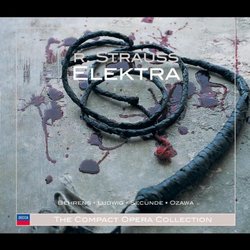| All Artists: Richard Strauss, Dominique Labelle, Brad Cresswell, Brian Matthews, Jorma Hynninen Title: Elektra (Dig) Members Wishing: 1 Total Copies: 0 Label: Decca Release Date: 2/11/2003 Genre: Classical Style: Opera & Classical Vocal Number of Discs: 2 SwapaCD Credits: 2 UPCs: 028947058328, 002894705832 |
Search - Richard Strauss, Dominique Labelle, Brad Cresswell :: Elektra (Dig)
CD Details |
CD ReviewsStrike Again! Guntram | PR,Brazil | 03/03/2005 (5 out of 5 stars) "Behrens in wretched voice?I just can't understand these guys...I never heard a better recording by her before(I'm not an admirer Behrens' singing,if you read my others rewiews).I was stupefied by her "Triff noch einmal!",her fierce hate on scene VII,etc.Ludwig is amazing.I just can not put this in words.My biggest surprise;in despite of his respect to Strauss' mozartian idea to perform Elektra,I heard an energetic Ozawa here,so different of his Salome and Carmen.Besides,the best five maids ever(pay very attention on)and this amazing infallible BSO french horn section!Whow!Is this alive?What a lot of fine Elektras on cd's!" An excellent recording Samuel Andreyev | Paris, France | 12/12/2004 (5 out of 5 stars) "It's true that the demented intensity of the Nilsson performance is hard to top, but this is an excellent modern recording and is recommended to all Strauss enthusiasts. It also has the benefit of very clear sound and a strong orchestral performance, both of which are essential if you want to hear every detail of the orchestration." I love Elektra -- here are some details Patrick W. Crabtree | Lucasville, OH USA | 06/17/2008 (5 out of 5 stars) "For the uninitiated, here is the story of Elektra:
She's an Egyptian Princess. Her mother conspires with a lover to kill her father and they do so. Elektra's younger brother is sent far away while he is very young and avenging his father's murder becomes his life quest. Elektra is the only one (other than her brother) who cannot let go of what her mother has done. At one point, a servant upholds Elektra's ethical stand and is subsequently severely beaten by other servants for her unpopular righteousness. Even Elektra's sister wants no part of avenging their father's death. Ultimately, Elektra's brother makes a surprise return and carries out the justified deed -- and I'll stop right there to avoid a SPOILER! I was harboring mixed expectations when I originally bought this CD. On one hand, I wasn't sure that The Boston Symphony Orchestra, for all their well-deserved acclaim in performing symphonies and similar works, was necessarily the appropriate musical faction to pull off this very difficult opera. I had similar concerns in regard to the famous and renowned conductor, Seiji Ozawa -- I was unaware as to how much opera he had ever conducted in the past. My concerns quickly fell away as I listened to this fine performance. The chief vocalists for this notable performance were Hildegard Behrens as Elektra; Christa Ludwig as Clytemnestra, (Elektra's mother and Queen of Thebes); Nadine Secunde as Chrysothemis, (Elektra's sister); Ragnar Ulfung as Aegisthus, (Clytemnestra's lover), and; Jorma Hynninen as Orestes, (Elektra's younger brother). I thought that they were all magnificent in their respective roles, as was the Tanglewood Festival Chorus; and the Decca technicians did terrific work in harnessing both the broad ambiance of the opera as well as in ensuring the excellent sound quality of the recording. This performance is sung in German, as the libretto was originally written; however, you can read the English, French, and/or Italian translations of this libretto on your computer with this CD. This CD is interactive and one can access the libretto simply by playing the work on the computer -- Windows 95 OSR2 or higher is required. Richard Georg Strauss live from June 11, 1864 to September 8, 1949. He was a German composer of the late Romantic era and early modern era and was especially noted for composing superb tone poems and operas. Strauss was also a renowned conductor. Elektra itself is a lengthy, one-act opera, based upon a Greek tragedy. This particular performance is conveyed on two CDs and runs just over 102 minutes via twenty-six movements. The work is much enhanced with a libretto written by Hugo von Hofmannsthal adapted from his drama of 1903. Elektra was the first of numerous subsequent collaborations between Hofmannsthal and Strauss. The opera premiered at the Dresden State Opera on January 25, 1909 where it remains in the repertoire. From Wikipedia: "Musically, Elektra deploys dissonance, chromaticism and extremely fluid tonality in a way which recalls but moves beyond the same composer's 'Salome' of 1905, and which represents Strauss's furthest advances in modernism, from which he later retreated. The bitonal or extended Elektra chord is a well known dissonance from the opera while harmonic parallelism is also prominent modernist technique." Finally, this performance of Elektra, (a semi-staged 1998 live recording at Boston Symphony Hall), is but one entry in the "Decca Compact Opera Collection". The other collection performances include: 1. Il Barbiere di Siviglia, (Rossini), Marriner/Ambrosian Opera Chorus 2. La Boheme, (Puccini), Roma,Serafin/Accademia di Santa Cecilia 3. Don Giovanni, (Mozart), Solti/London Philharmonic Orchestra & London Opera Chorus 4. Lucia di Lammermoor, (Donizetti), Lopex-Cobos/Ambrosian Opera Chorus 5. Norma, (Bellini), Bonynge/London Symphony Orchestra and Chorus 6. Madame Butterfly, (Puccini), Roma,Serafin/Accademia di Santa Cecilia 7. Orfeo ed Euridice, (Gluck), Gardiner/Montiverdi Choir 8. Rigoletto, (Verdi), Sinopoli/Accademia Nazionale di Santa Cecilia 9. La Traviata, (Verdi), Pritchard/Maggio Musicale Fiorentino 10. Die Walküre, (Wagner), Leinsdorf/London Symphony Orchestra You won't get hurt on this fine recording -- highly recommended." |

